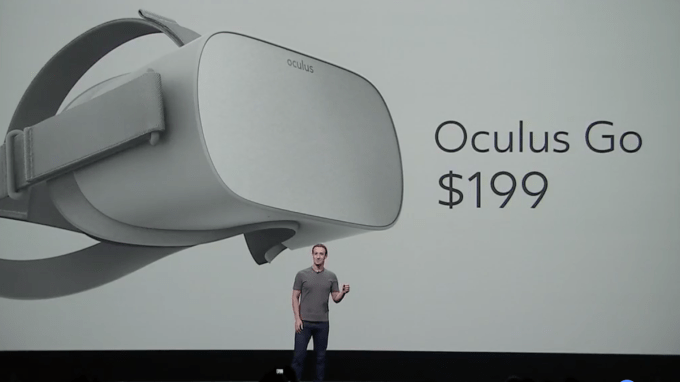Today, Facebook’s VR ambitions looked inwards.
The newly announced $199 Oculus Go headset and upcoming high-end “Santa Cruz” standalone will come with something past headsets haven’t: power buttons.
By controlling the end-to-end experience, Facebook gets to tackle VR with a Cupertino-like approach to hardware that lets them avoid the headaches of Windows/Android and the OEMs that build for them. While the company’s past efforts have been intricately tied to the fractured smartphone and PC markets, Facebook made clear Wednesday that their future is wireless, uniform and all about their platform.
Oculus Go will save Facebook from having to build complex partnerships with smartphone manufacturers that are 100x easier for Google to gain through Android anyway. Samsung is Oculus’s only friend when it comes to mobile VR, and this year the company put both of its flagship smartphones on Google Daydream, as well. This move could likely signal a future where Oculus moves away from smartphone mobile VR as they shift to building their own platforms and letting Google dominate VR on Android, which was a bit of an inevitability anyway.
The high-end “Santa Cruz” headset doesn’t need Windows and will instead rely on onboard compute. Oculus was more than a little vague in how they portrayed the device, so I won’t assume too much, but there’s little doubt that the headset will be less powerful as a standalone than what the Rift can currently handle. That may end up disappointing die-hards, but subtle movements of the high-end market away from being tethered to a PC is going to do Facebook a lot of favors in terms of platform sustainability and leaving the early-adopter niche.
The thing is, there’s been this misconception that Valve or Samsung or Microsoft or Sony are Oculus’s competitors, when the fact is that their main competitor is irrelevancy.

Zuck introduces the $199 Oculus Go headset
What’s important is that these moves isolate Facebook and Oculus from other tech giants getting cold feet in the race to build VR tech. With standalone headsets, Facebook can take its massive war chest and the billions of dollars it’s already pledged and put on its blinders, undercutting competitors’ prices and plugging ahead even if headset numbers fail to immediately impress.
Mark Zuckerberg seems unlikely to shift his assertion that VR is the future, and with that steadfastness, if there’s a market in VR, Facebook will likely be the one to realize it, both on the hardware side with Oculus and what Facebook has shown with software like Spaces.
Facebook bought Oculus VR more than three years ago and the ride since has been pretty bumpy. Scandals, product delays, executive overhauls and expensive lawsuits have all partially defined the company’s VR ambitions thus far. What comes next is anyone’s guess, but for Facebook it will finally be their choice to make.
